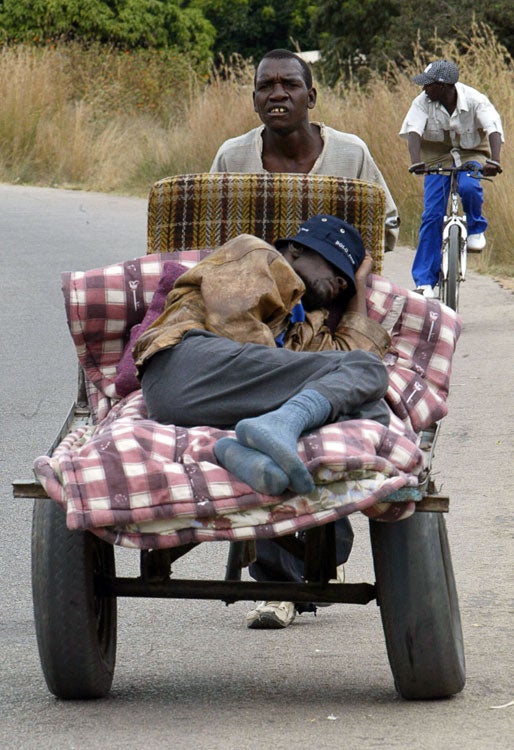Zimbabwe's slums pay fitting testimony to Mugabe's misrule

Your support helps us to tell the story
From reproductive rights to climate change to Big Tech, The Independent is on the ground when the story is developing. Whether it's investigating the financials of Elon Musk's pro-Trump PAC or producing our latest documentary, 'The A Word', which shines a light on the American women fighting for reproductive rights, we know how important it is to parse out the facts from the messaging.
At such a critical moment in US history, we need reporters on the ground. Your donation allows us to keep sending journalists to speak to both sides of the story.
The Independent is trusted by Americans across the entire political spectrum. And unlike many other quality news outlets, we choose not to lock Americans out of our reporting and analysis with paywalls. We believe quality journalism should be available to everyone, paid for by those who can afford it.
Your support makes all the difference.Beyond the wealthy suburb of Borrowdale, past the high walls of the Mugabe estate with its mansion whose lavish furnishings make for urban legends, live the people who are truly at the bottom of the heap.
The first sight of them comes after driving through the gates of the city dump. People caked in filth and dressed in rags crowd around the car pressing their faces against the windows, trying to see what the rubbish bags in the back might hold. They are part of a growing army of scavengers who have come to the last place in this collapsing country where they might find something for nothing.
Harassed officials wave our car down a bumpy track of churned earth and flattened garbage that winds its way between the mighty mounds of detritus. In each cul-de-sac, beseeching arms wave at you to come to them – give them your rubbish. With each lurch of the vehicle flocks of birds lift off from the mounds in white squadrons. Animals and humans scatter and regroup looking for scraps. Within seconds of stopping, strangers' hands have opened the back of the car and the boot is emptied of six stinking bags of rotten food waste, thrown away tins and unwanted plastics. This treasure is jealously guarded, taken like dogs with bones to a safe distance, where the sacks are emptied on to the floor and sifted through.
An old man too slow to get the bags this time chews the broken shells of someone else's discarded peanuts which quickly reappear between his missing teeth. When asked what they're looking for, he says "empty plastic containers, cardboard, anything we can sell".
Garbage collection, once a twice-weekly public service has become a thing of the past in this city. A truck might appear once a month in the well-to-do areas but otherwise it's a trek to the dump for those that have a car and don't like the smell.
Knight is a regular at the dump and my guide. "It's quiet today," he says. "Sometimes they fight for cars. Actually fight. You will see a man bang the car and call out: 'Mine! This one's mine'."
A few yards away Florence is looking for a lift into town. "I used to be a street vendor but the inflation has made it impossible," she says. Now the rubbish dump is her place of work and her job is to find something, anything.
Florence, who has four children, sifts through rubbish at the dump from eight in the morning until nearly four in the afternoon. Her husband died 10 years ago of an illness she would rather not discuss. "The smell is terrible but what can I do? If I stay home then there is nothing to eat at the end of the day." She hates the birds but hates the rats even more and there are plenty of them. "What choice do I have, I don't like it but I have to endure." Today is a good day for Florence, someone gave here a set of six water glasses still wrapped, which are probably worth half an average week's earnings.
Leaving the dump there is another of the many roadblocks that have appeared across the country since the weekend's elections. This time it's not the police but volunteer workers. Ragged trousered entrepreneurs, they have set about fixing the epidemic of pot holes that blight the capital and beg for donations from passing cars. A bucket, some red dirt, stones and a shovel – it's not much of a start but there's a lot of work to do.
Join our commenting forum
Join thought-provoking conversations, follow other Independent readers and see their replies
Comments